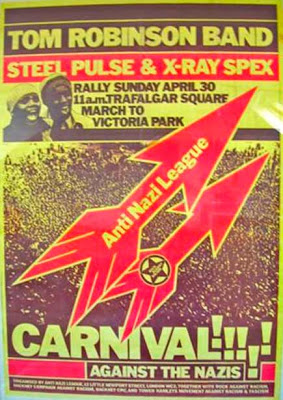
Walls Come Tumbling Down:
The Music and Politics of Rock
Against Racism, 2 Tone and Red Wedge
Daniel Rachel
Picador, 2016
ISBN 978-1447272687
John
Harris in the Guardian has written a
decent review of Daniel Rachel’s book, which is a sort of cultural history of
the left from the mid-1970s to the 1990s – see
https://www.theguardian.com/books/2016/sep/28/walls-come-tumbling-down-daniel-rachel-review
I
want to make a few history-related points on the book here. I was indeed there.
I was at the battles of Wood Green and Lewisham, at the Carnivals and on the
streets. I still have a pair of steel toe capped Doc Martens and they weren’t
(mostly) used for industrial purposes. They were, and the book captures this
well, different times.

In
the late 1970s I did not walk down any street without scrutinising those also
walking to see if they might be fascists who were about to attack me. I don’t
do that now because the current strength of organised fascism is low. Indeed I
moved to my current address in central
Tottenham precisely because it is so difficult to find. Not that difficult
though because the front window still has a bullet hole in it, which I’ve left
as a memoir of different times. I wasn’t in when the bullet was fired, but the
windows are double glazed as a precaution anyway. The times are not so
different though. Racism still needs to be fought, big time in the age of
Farage and Trump. Whether music will be as central remains to be seen perhaps.
Anyway,
the book is essentially an oral history covering Rock Against Racism and the
Anti-Nazi League, Two Tone and Red Wedge. The author has assembled quotes from
a extensive range of people under subject headings in more or less
chronological order.
I’d confess as a professional historian to not being that
enthusiastic about oral history because memory is unreliable and quite
difficult to check. I
wouldn’t bet on every last statement in the
book being accurate but that isn’t really the point. Instead it gives a real
flavour of how culture, music and the left came together to fight fascism,
racism and the right and some idea both of the breadth of the support needed to
do this and the importance of having some coherent political organisation at
its core, whether this was the SWP or the Labour Party or both.
Of
course Red Wedge was not Rock Against Racism and the distinct parts of the book
perhaps don’t have such an automatic follow on. Nor is there an attempt,
understandably it being an oral history, to grapple with what precise longer
term impact something like RAR had.
Since
I was there and know a lot of the people interviewed well the book does read to
me like all my yesterdays. But allowing old socialists to recall the past is
hopefully not what it is meant to be about. It should be read by those who were
NOT there both to get some sense of how movements were built and what is
possible, and hopefully to inspire activity and organisation now.
You
can always criticise and hopefully there is a positive purpose to that but
beyond that this is a book you should read whether you were there and
particularly if you were not.
Keith Flett
From London Socialist Historians Group Newsletter 60 (Spring 2017)

No comments:
Post a Comment